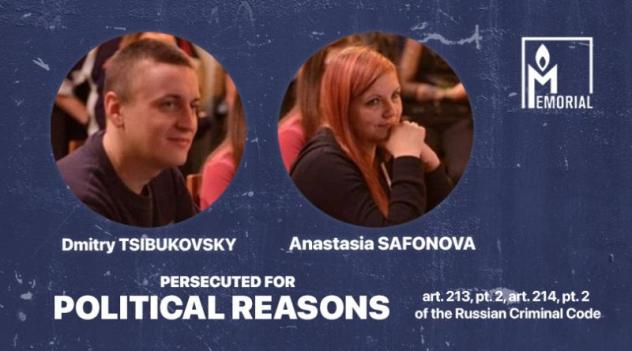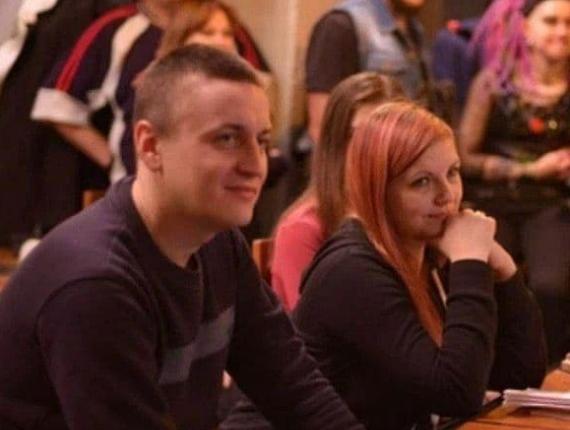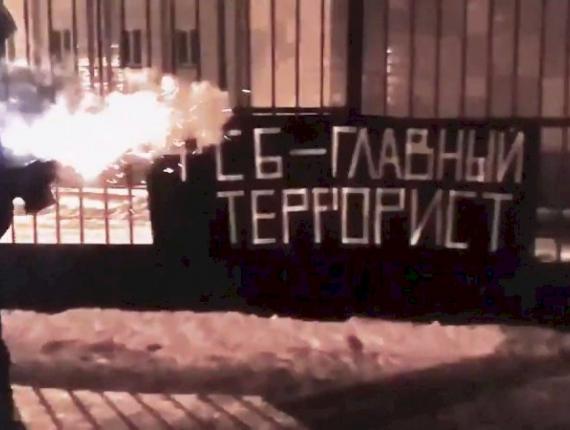The prosecution of Chelyabinsk anarchists Dmitry Tsibukovsky and Anastasia Safonova is unlawful and politically motivated
The activists were initially sentenced to terms of imprisonment in the case of a banner with the words ‘The FSB is the main terrorist.’ The conviction was quashed on appeal but the charges have still not been dropped
Memorial Human Rights Centre, in accordance with international guidelines, considers the criminal prosecution of Chelyabinsk activists Dmitry Tsibukovsky and Anastasia Safonova politically motivated. The case is intended to force critics of the authorities to cease their public activities and to intimidate society as a whole.
We believe the prosecution of Tsibukovsky and Safonova is related exclusively to their political views and their exercise of freedom of expression, and is also an act of revenge by members of the local security services. Remanding the two activists in custody at the insistence of the prosecution by a court of first instance is clearly disproportionate to the acts for which they have been charged.
Memorial demands that all the charges against Dmitry Tsibukovsky and Anastasia Safonova be immediately dropped.
- What is the essence of the case against the Chelyabinsk activists?
On the night of 14-15 February 2018 a banner appeared on the fence of the Chelyabinsk FSB headquarters with the words ‘The FSB is The Main Terrorist’. A video capturing the protest begins with the words: ‘In solidarity with anarchists who suffer repression all over the country we paid a visit to the FSB headquarters.’ Three people in black then proceed to hang a banner on the fence outside the FSB building, after which one of them lights a flare and throws the burning object onto the snow on the other side of the fence. No one is near them and all three get away unimpeded.
Three Chelyabinsk residents, including Tsibukovsky and Safonova, were immediately charged with hooliganism (Article 213, Part 1, of the Russian Criminal Code), a criminal case that was first closed in June of the same year ‘due to lack of evidence of a crime.’ In the autumn of 2018, the case was closed for a second time on the same grounds.
However, two years later, Tsibukovsky and Safonova were again detained, this time in Tula where they were then living. This time the charges were more serious: hooliganism motivated by political hatred and enmity, committed by a group of people in prior collusion (Article 213, Part 2, of the Russian Criminal Code) and vandalism motivated by political hatred and enmity, committed by a group of persons in prior collusion (Article 214, Part 2).
On 10 September 2021 the Central district court of Chelyabinsk found the anarchists guilty on both counts. Dmitry Tsybukovsky was sentenced to two years and six months in a general regime penal colony while Anastasia Safonova was sentenced to two years, also in a general regime penal colony.
On 24 November 2021 Chelyabinsk Regional Court overturned the sentence and ordered that the case be retried in a court of first instance. The activists were released from the pre-trial detention centre, with certain restrictions imposed. Nevertheless, the charges against them were not dropped.
The prosecutor's office demanded that the anarchists be sentenced to six years in prison.
- Why does Memorial consider the prosecution of the two anarchists from Chelyabinsk unlawful and politically motivated?
After studying the case materials, Memorial concluded that the actions of Anastasia Safonova and Dmitry Tsibukovsky do not fall, in terms of facts and legal meaning, under Article 213, Part 2 of the Russian Criminal Code (‘Hooliganism motivated by political hatred and enmity, committed by a group of persons in prior collusion,’ (or, additionally, in the case of Tsibukovsky, ‘with the use of objects used as weapons’) or Article 214, Part 2, of the Russian Criminal Code (‘Vandalism motivated by political hatred and enmity, committed by a group of persons in prior collusion’).
Neither the placing of the banner on the fence outside the FSB building in the middle of the night, nor the writing of graffiti against pension reform on the facade of the building, the electricity substation and shed contained all the features necessary to classify the acts as criminal. Moreover, classification of a statement critical of the work of public officials or public authorities expressed in a nonviolent form as committed on grounds of political hatred and hostility is criminalization of a negative attitude toward the activities of a state body. This is inadmissible and directly contradicts the Constitution of the Russian Federation, which guarantees the right to freedom of speech and expression.
The facts of the case clearly demonstrate the political motive of the prosecution, namely intolerance on the part of law enforcement agencies towards representatives of the anarchist movement and the desire to suppress any public criticism of illegal and unlawful methods widely used by representatives of the special services, in particular the FSB. The fact that the case was twice closed ‘for lack of evidence of a crime’ indicates that the prosecution of the Chelyabinsk anarchists is of a political nature, and not related to the public danger represented by their actions.
Recognition of an individual as a victim of a politically motivated prosecution does not imply Memorial Human Rights Centre agrees with, or approves of, their views, statements, or actions. If it transpires that at a subsequent stage of the case the activists are again found guilty, and the sentence handed down to them involves deprivation of liberty, we shall consider them to be political prisoners.
A more detailed description of this case and the position of Memorial is available on our website.
- How to help
You can support all political prisoners by donating to the Fund to Support Political Prisoners of the Union of Solidarity with Political Prisoners via PayPal, using the e-wallet at helppoliticalprisoners@gmail.com.
Поделиться:
- ВКонтакте
- РћРТвЂВВВВВВВВнокласснРСвЂВВВВВВВВРєРСвЂВВВВВВВВ
- Telegram



